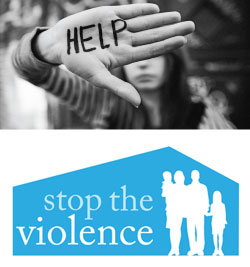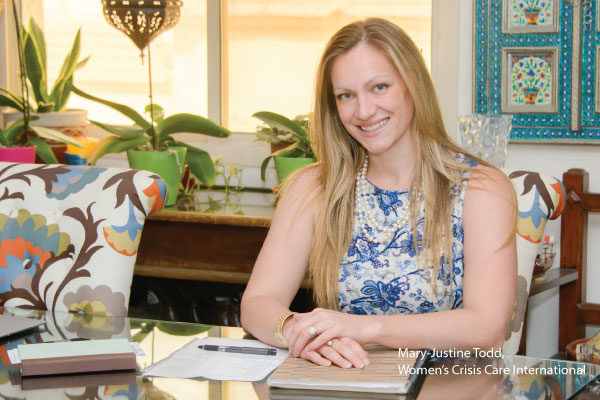A new service has been launched to help women at their most vulnerable. Liz O’Reilly spoke to Mary-Justine Todd of Women’s Crisis Care International to find out more.
Imagine you have been raped or beaten, physically or sexually assaulted. Not a comfortable thought! Now imagine you are at the hospital. Someone wants to take your blood, someone else wants to perform an intimate examination. It may be a case of domestic violence and you’ve, at last, found the courage to seek help, so there’s a police officer wanting to take your statement.
And all you want is to be left alone! You’re worried about your kids, yourself, where will you spend the night? What’s
going to happen tomorrow? You’re in pain and frightened and you need a friend, someone who’s 100 per cent on your side and someone who will be by your side to help you get through.
That’s where Women’s Crisis Care International (WCCI) comes in. Set up in January by Mary-Justine Todd, herself a certified rape counsellor in the USA who has managed similar programmes in New York City and Sub-Saharan Africa, the service aims to get to women at the point of crisis and offer help and support.
“When a woman is the victim of domestic or sexual violence, it is not uncommon that she will never go for long-term help,” says Mary-Justine. “There is a window of opportunity we have to reach these women, when they are at the hospitals, so that’s where the crisis counsellors go.”
 Mary-Justine started working on the project when she came to Bahrain to join her husband two years ago and found there were many wonderful services offered, but no specific violence crisis service available. Now, with the support of some of Bahrain’s most powerful families and female members of the Shura Council, WCCI is operational and has a vision to “be a global leader in the promotion of effective crisis response care for survivors of domestic and sexual violence, as well as in providing counselling for survivors, thereby promoting the overall empowerment of women around the world”.
Mary-Justine started working on the project when she came to Bahrain to join her husband two years ago and found there were many wonderful services offered, but no specific violence crisis service available. Now, with the support of some of Bahrain’s most powerful families and female members of the Shura Council, WCCI is operational and has a vision to “be a global leader in the promotion of effective crisis response care for survivors of domestic and sexual violence, as well as in providing counselling for survivors, thereby promoting the overall empowerment of women around the world”.
Mary-Justine is very quick to point out that, though statistics on rape and domestic violence are not readily available in the region, “This is not a Bahraini problem, it’s a world problem. The statistics that do exist through the World Health Organisation show that one in three women globally will have experienced some sort of domestic or sexual violence, which is about the same throughout the world.
“And, in fact, when you research it, Bahrain has some very strong and progressive laws protecting women. People just sometimes are not aware of that.”
The first set of 20 voluntary advocate counsellors underwent their 40-hour training during January and February and are now working to collaborate with two of the island’s biggest hospitals.
Mary-Justine says: “All the counsellors are volunteers as that’s the best way to ensure the focus stays on the victim. If you put people in a paid situation, they are going to be looking to progress their careers, writing reports, answering to their manager. This way, it is 100 per cent about the women who need help and the counsellors are there because they want to be.”
Duty advocate counsellors are on call 24/7 and WCCI is also working with the hospitals to train staff to spot the signs of domestic or sexual abuse.
“A counsellor is not going to walk into a traumatised woman and say ‘Hi I’m here because you got raped’, the training is about using sensitive language and trying to make the women feel less vulnerable. It might also be that, in the case of domestic violence, the woman will not have said what’s happened, maybe passing her injuries off as an accident.
“In this case the counsellor will say something like ‘I deal with women who may have difficult issues and I’m here for you if you want to talk’.
“Sometimes the woman will say there’s not a problem or even tell the counsellor to go away and, if that’s the case, they will just say ‘OK, I’m going to be outside for a while in case you change your mind’.
“Once the women do start to talk and accept help, the most important thing we tell them is ‘it’s not your fault!’.
“Our job is to act as a bumper and a bridge. For a vulnerable survivor of sexual or physical assault, the whole hospital process can be a bit overwhelming. Everyone, from the nurse taking a blood sample to the police officer taking a statement, is doing their job and trying to help but sometimes it just needs someone to say ‘step back and give her some breathing space’ and that’s the advocate’s job.
“We also act as a bridge in that survivors will often need access to further services such as ongoing counselling or practical things like changing the locks on their home or sorting out childcare. The advocates who are with the women at the time of crisis can put them in touch with these services and, though many of the first group of advocates are actually trained counsellors, they will put the women in touch with different professionals once out of the hospital situation which we find is better and safer for everyone involved.
“It’s also important to remember that we never offer advice, only information to give the survivor the option of deciding what they want to do and then helping them get there.”
WCCI will shortly be recruiting a second wave of around 50 volunteer counsellor advocates who it’s hoped will begin their training in September. To be involved you don’t have to have any special qualifications as the training is specifically tailored to the crisis role but you must be prepared to be on-call for 24-hour duty periods, one or two times each month.
WCCI held a sisterhood lunch at the end of May to thank those who have helped get the project off the ground and are continuing to offer support. Attendees included female members of the Shura Council who Mary-Justine says have been very supportive.
For more information visit www.womenscci.org


































